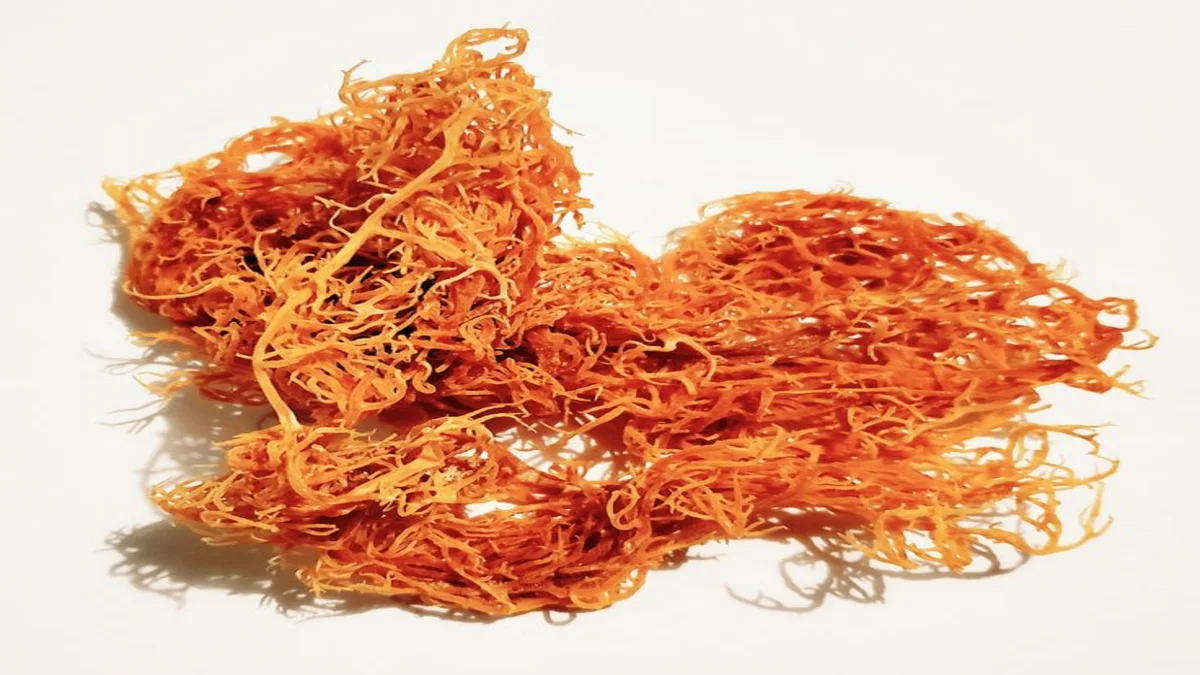Have you heard about the amazing benefits of sea moss? This nutrient-rich seaweed has been touted for its health benefits, from boosting immunity to promoting healthy skin. If you want to improve your overall well-being, incorporating sea moss into your diet could be just what you need.
What is sea moss?
The scientific name for sea moss is Chondrus crispus, and it belongs to the algae or seaweed family. It is seen growing in the waters between North America and Europe along the rocky Atlantic shores.
Like other seaweeds, algae, and other well-known green sea vegetables like kelp or dulse, it is an edible sea plant.
The hues of it include different tones of green, yellow, purple, red, brown, and black.
The most prevalent types, frequently referred to as Irish moss, are often red and thrive in warmer climates.
Sea moss nutrients
| Nutrient | Description |
|---|---|
| Iodine | Essential for thyroid function and metabolism. |
| Calcium | Important for bone health and muscle function. |
| Magnesium | Supports muscle and nerve function, energy production. |
| Potassium | Regulates fluid balance, muscle contractions, and nerve signals. |
| Iron | Vital for blood production and oxygen transport. |
| Zinc | Boosts the immune system and aids in wound healing. |
| Vitamin C | Antioxidant that promotes skin health and immune function. |
| Vitamin A | Crucial for vision, immune function, and skin health. |
| Vitamin K | Important for blood clotting and bone health. |
| Folate (Vitamin B9) | Supports DNA synthesis and repair, and cell division. |
| Omega-3 Fatty Acids | Supports heart health and reduces inflammation. |
| Dietary Fiber | Promotes digestive health and regularity. |
Sea Moss Benefits
1. May prevent Parkinson’s disease
Parkinson’s disease is the second most common degenerative disease in older adults. It causes tremors, stiffness, and slow movement, and there is no cure. However early research shows that it may be able to slow the worsening of the disease.
An extract from it was found to lessen stiffness and slowness of movement in a worm-based investigation. This may indicate bright futures for Parkinson’s patients. To find out if sea moss benefits people in the same way as it benefits worms, more investigation is necessary.
2. Might strengthen the immune system
According to preliminary research, it may even be able to prevent the body from catching salmonella and strengthen the immune system.
According to one study, it can inhibit the growth of S. enteritidis, the human salmonella-causing bacteria. However, the impact has not been replicated in humans or animals, and this is a very early study. To find out if sea moss can prevent or treat human salmonella, more research is required.
3. Could aid thyroid function
Because sea moss is high in iodine, it may be beneficial for those who suffer from hypothyroidism, a disorder in which the thyroid hormones that control metabolism are not produced in sufficient amounts by the body. The process of metabolism converts the food you ingest into energy and controls bodily functions like breathing and heart rate. However, especially if you’re already taking medicine for your hypothyroidism, see your doctor before using it for management.
4. It might encourage losing weight.
Recall the amount of fiber found in seaweed. Because they are full, foods high in fiber may prevent you from overindulging. According to Czerwony, “Fiber keeps us fuller for longer, which may help with weight control.”
5. It is an excellent iodine source.
One of the most important nutrients for a functioning thyroid is iodine, which you must obtain from your food as your body is unable to produce it. (The majority of individuals, however, obtain adequate iodine from seafood, dairy products, and iodized salt.)
6. It supports gut health
Both beneficial and harmful bacteria are abundant in your digestive system. Keeping those bacteria in check is crucial to your wellness since gut health is linked to general health. Sea moss is one type of algae that is a good source of living bacteria and fiber. According to Czerwony, “it can help replenish the good bacteria in our gut.”
7. It can help with muscle growth and recovery from exercise.
Taurine, an amino acid that aids in muscle growth, is abundant in it. According to Czerwony, “Our muscles experience tiny microtears during exercise, but amino acids can aid in that healing process.”
A staple of workout, it also contains roughly 6 grams of protein per 100 grams. But don’t depend on sea moss alone to help you recuperate after exercise! You still need to make sure you’re receiving adequate rest, hydration, and wholesome food.
Sea Moss Side Effects
While sea moss is celebrated for its numerous health benefits, it is important to be aware of potential side effects associated with its consumption. One of the primary concerns is its high iodine content. Iodine is crucial for thyroid function, but excessive intake can lead to thyroid dysfunction, including hyperthyroidism or hypothyroidism. Individuals with pre-existing thyroid conditions should be particularly cautious and consult with a healthcare provider before adding sea moss to their diet.
- Another potential side effect is digestive discomfort. It is rich in dietary fiber, which can cause bloating, gas, and stomach cramps if consumed in large quantities, especially for those who are not accustomed to high-fiber diets. Gradually increasing the intake of it can help mitigate these digestive issues.
- Contamination is also a concern with it, as it can absorb heavy metals and pollutants from the water in which it grows. Consuming contaminated it can lead to heavy metal poisoning, which can cause serious health issues. Therefore, it is crucial to source sea moss from reputable suppliers who test for contaminants.
- Allergic reactions are another possible side effect. While rare, some individuals may experience allergic reactions to it, manifesting as skin irritation, swelling, or respiratory issues. If you experience any signs of an allergic reaction after consuming sea moss, it is advisable to seek medical attention immediately.
- Finally, due to its anticoagulant properties, it may interfere with blood clotting. This could be a concern for individuals taking blood-thinning medications or those with bleeding disorders. Consulting a healthcare professional before incorporating sea moss into your diet is recommended to avoid adverse interactions with medications or pre-existing health conditions.
How to prepare sea moss?

Preparing sea moss for consumption involves a few steps to ensure it is clean, safe, and ready to be used in various recipes. Here’s a step-by-step guide on how to prepare sea moss:
1. Cleaning the Sea Moss
- Rinse Thoroughly: Place the dried sea moss in a large bowl and rinse it thoroughly under cold running water to remove any debris, sand, or salt.
- Soak in Clean Water: Fill the bowl with clean, cold water and let the sea moss soak for 12-24 hours. During this time, the sea moss will expand and soften. Change the water a few times to ensure it remains clean.
2. Blending into Gel
- Drain and Rinse Again: After soaking, drain the water and give the sea moss another thorough rinse to remove any remaining impurities.
- Blend with Fresh Water: Transfer the soaked sea moss to a blender. Add fresh, clean water in a 1:1 ratio or as needed to achieve your desired consistency. Blend until smooth and creamy. If the mixture is too thick, add more water gradually until you reach a gel-like consistency.
3. Storing the Sea Moss Gel
- Transfer to a Container: Pour the blended sea moss gel into an airtight container.
- Refrigerate: Store the container in the refrigerator. The gel will thicken as it cools and can be kept for up to 3 weeks.
4. Using Sea Moss Gel
- Smoothies and Juices: Add 1-2 tablespoons of its gel to your favorite smoothies or juices for an added nutrient boost.
- Soups and Stews: Incorporate sea moss gel into soups and stews as a thickener and nutrient enhancer.
- Baking and Cooking: Use sea moss gel in baking recipes, such as cakes and bread, or cooking to enhance the nutritional content of your dishes.
- Skin and Hair Care: Sea moss gel can also be used topically as a face mask or hair treatment due to its hydrating and nourishing properties.
Tips
- Flavoring: Sea moss gel has a neutral taste, but if you prefer a flavored gel, you can add natural flavors like lemon juice or vanilla extract during the blending process.
- Portioning: Consider freezing portions of sea moss gel in ice cube trays for easy use. Once frozen, transfer the cubes to a freezer-safe bag or container.
Summary
Similar to seaweeds and sea algae, sea moss, also known as Chondrus crispus, is a spiky sea vegetable.
People gather it to extract the carrageenan. It is also used by businesses in consumer health supplements and as a natural thickening factor in commercial foods. It’s also simple to incorporate into meals and drinks or use it to create a gel at home.
Antioxidants and a range of vitamins and minerals can be found in sea moss, which may be good for your general health. Its nutritional makeup can vary, though, and if you eat a lot of it, you might end up eating a lot of iodine or heavy metals.
FAQs
What is sea moss good for?
Who should not take sea moss?
Why is sea moss so expensive?
References
- https://fdc.nal.usda.gov/fdc-app.html#/food-details/168456/nutrients nutrition
- https://pubmed.ncbi.nlm.nih.gov/25006699/ benefits
- https://www.ncbi.nlm.nih.gov/pmc/articles/PMC5992350/ benefits
- https://pubmed.ncbi.nlm.nih.gov/31159359/ benefits
- https://pubmed.ncbi.nlm.nih.gov/15896707/ benefits
- https://www.ncbi.nlm.nih.gov/pmc/articles/PMC3550831/ side effects
- https://pubmed.ncbi.nlm.nih.gov/28152409/ side effects
Disclaimer: The information provided here is for educational/awareness purposes only and is not intended to be a substitute for medical treatment by a healthcare professional and should not be relied upon to diagnose or treat any medical condition. The reader should consult a registered medical practitioner to determine the appropriateness of the information before consuming any medication. Elnodi does not provide any guarantee or warranty (express or implied) regarding the information’s accuracy, adequacy, completeness, legality, reliability, or usefulness; and disclaims any liability arising thereof.





